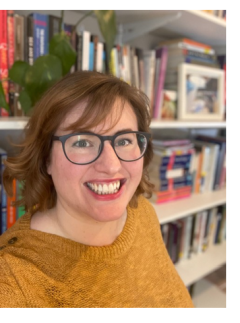22 April 2023
Bethany Logan
University of Sussex
The decision to work with colleagues in the School of Psychology to create an open textbook was an easy one to make. The University of Sussex Library was using an etextbook model to support first- and second-year Psychology cohorts, and we were finding that cost was high and that the usage could be better. One of the module convenors came to us and said:
I know what my students need, I could write their textbook.
And so, we said….
Let’s do it!
We managed to secure the funding to support a 12-month pilot project. This would cover the salary for a new member of staff in a fixed term role, and a subscription to the Pressbooks platform. I need to name check NUI Galway for sharing their experiences with PressBooks and the fantastic work they’ve been doing in the OER space. We’d dipped our toe in the open publishing waters before with a project hosted on Fulcrum, but it was NUI Galway’s open and honest feedback that gave us the confidence to dive in the PressBooks.
Dr Catherine Hall, the module convenor with the big ideas, took on the role of volume editor. She did a lot of the legwork in terms of getting authors on board as contributors and helping us design a projected production schedule. The idea was that multiple authors would share the workload, and that they would effectively be writing up their teaching notes rather than generating something from scratch. This approach was supported by School leaders; it very much aligned with University desire to recognise academic colleagues on ‘education and scholarship’ pathways.
Dr Catrina Hey, our project worker, effectively ran the show. And yes, it does get confusing when you’ve got people with the same initials on a project. We had imagined that Catrina’s role would involve a lot of tech support, guidance on formatting and copyright. In reality, a significant proportion of her year was spent encouraging, cajoling, and reminding our authors of impending, or sometimes even missed, deadlines. My respect for publishers working in ‘author services’ has never been greater.
It was extremely fortunate that during the pilot year another project came our way, this time a piece of scholarship that was already written and -mostly- formatted. This gave us an opportunity to stress-test the systems, a pilot within a pilot. The outcome of that is 100 Ideas in Active Learning. This unexpected offering gave us something to focus on while our Psychology authors worked on their chapters.
The textbook work really ramped up towards the end of 2022, when the final, final, final deadlines were approaching. There was a huge amount of work to do here. Some of which we had not quite anticipated, for example reference formatting, image licence triple-checking, and spelling standardisation. In all honesty, these are things that -as library professionals- we should have anticipated but hadn’t made it into our production plan a year earlier, when we were fresh faced open publishing newbies.
Introduction to Biological Psychology is now published. It has been embedded into first year Psychology teaching and looks absolutely stunning, with full credit to our fabulous scientific illustrator Dr Eliza Wolfson. Fourteen authors – from Sussex and other institutions- contributed chapters and were supported by academic reviewers, student testers and library staff who got roped in at the last minute for vital tasks. We are delighted with the outcome and can see immediate benefits for University of Sussex students, and our library budgets. The response from the wider library sector on social media has also been an incredible reminder of why I love working in this space. But there’s an ongoing piece of work around promotion and discoverability. Areas where we need to develop and grow our expertise. Of course, the Library’s bottom line is important, but we’re doing a disservice to everyone involved if we don’t help get this textbook in front of as many psychology students as we can and- crucially- help support the adoption of the textbook onto Psychology teaching at UK HEIs and beyond.
We also need to think about what’s next for us at Sussex. In a strong display of commitment towards our open infrastructure goals, we got approval to make the project work post permanent, and I am very pleased to have a Dr Hey on my team as our Open Publishing Supervisor. We are keen to expand our open publishing capacity.
It would be straightforward enough (deadline pain aside) to simply try to reproduce the pilot project in another subject area. Disciplines like Law and Business are crying out for more affordable textbook options. However, we need to do some proper evaluation. One of best things about our pilot project was that we had space to fail. I am proud of what we did, but we need to ask ourselves some tough questions:
So, we didn’t fail, but how could it have been better?
We need to understand where we went wrong, and what it is that we don’t know. There are so many other actors in the open books landscape doing amazing things. And when you’re in the weeds with a project, it can be hard to keep track of all of the exciting developments going on outside your institution. So, our evaluation period is a really important opportunity for us to reflect and take stock of what we’ve done. We will be looking more closely at what everyone else is doing, and learning from experts and collaborators, from publishers, libraries, and open book initiatives in order to develop a service that meets the needs of the University of Sussex research community, and contributes to the wider open book ecosystem.

